新概念英语第一册第71课
新概念英语第一册第71课
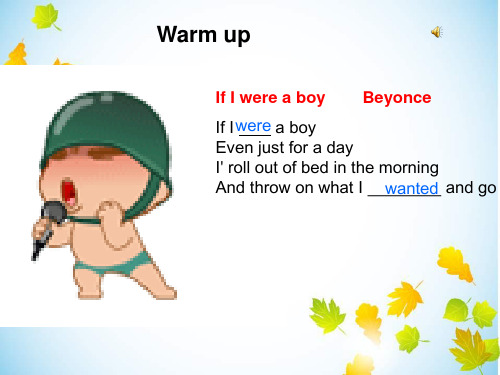
Answer these questions: 1.What’s Ron Marston like? Why? 2.Did Ron Marston telephoned Pauline at nine o’clock yesterday? 3.How did Pauline answer the phone at nine o’clock?
5. This is Pauline’s mother.
打电话的基本用语
Hello! This is XXX speaking. May I speak to XXX? 如果幸运,接电话的是你要找的人,对方会说:Yes, speaking.(我就是。) 如果接电话的不是你要找的人,对方会说:He/She„s not in .(他/她不在。) 等一会儿,别把电话挂断:Wait a minute. 稍等片刻:Hold on a second. 你接了找别人的电话,对要找的人说: A call for you./You are wanted on the phone.
Grammar force : simple past tense:
构成 陈述句:主语+be动词过去式+表语
We were students three years ago.
主语+动词过去式+其他
He arrived home at six o‟clock yesterday evening. 一般疑问句:助动词+主语+动词原形+其他
Test time
phone [ə'gein] ['ɔ:ful] awful again telephoneBiblioteka time[sei]
[fəun]
新概念英语71课单词

新概念英语71课单词新概念英语第71课的单词包括:
1. Prosperous.
2. Unemployment.
3. Inflation.
4. Deflation.
5. Recession.
6. Recovery.
7. Economic.
8. Downturn.
9. Boom.
10. Slump.
"Prosperous" 意为“繁荣的”,"Unemployment" 意为“失业”,"Inflation" 意为“通货膨胀”,"Deflation" 意为“通货紧缩”,"Recession" 意为“经济衰退”,"Recovery" 意为“复苏”,"Economic" 意为“经济的”,"Downturn" 意为“衰退”,"Boom" 意为“繁荣”,"Slump" 意为“暴跌”。
这些单词是与经济和金融相关的,掌握它们可以帮助我们更好地理解和讨论与经济相关的话题。
在学习这些单词时,可以结合实际情境进行练习,例如阅读相关的经济新闻或文章,以加深对这些单词的理解和记忆。
同时,也可以通过与他人讨论经济话题的方式来运用这些单词,从而加深记忆。
希望这些单词对你的学习有所帮助。
新概念英语一册第71-72课件

• • • •
句型转换: 1. It was an exciting finish. (变同义句) _____________________________ 2. You can see us. We are standing on the left.(合为一句) • ________________________ • 3. We were at church last Saturday.(对划线部分 提问) • ___________________________
JANE: What did your boss say to him? PAULINE: He said, "Pauline is typing letters. She can't speak to you now!" say (said) v 说(强调内容) say to sb speak to sb. 与某人说话 May I speak to Pauline, please? I’d like to speak to Pauline, please. 在电话中回答: This is….
What is sb. like? 询问某人的外貌或品行。 What's your father like? What’s … like? 什么怎么样?
What's the climate like in your country? What's the weather like in spring?
JANE: Did he telephone again last night? PAULINE: Yes, he did. He telephoned at nine o'clock. last year/ month / week/ night
新概念英语第一册71-72

练习一:
1. can he ____a story in English? A. tell B. speak C. say D. talk 2. The teacher _____ us to finish the homework in time. A. tells B. speaks C. says D. talks 3.What would you like to ______ us about you hometown. A. speak B. talk C. say D. tell
二、 用所给词的适当形式填空。
came 1. Tom and Mary ___________ (come) to China last month. 2. Mike _________________(not go) to bed until 12 o'clock didn't go last night. So he ______ got (get) up late. read 3. Mary __________ (read) English yesterday morning. began 4. Tom ___________ (begin) to learn Chinese last year. 5. My mother ________________ (not do) housework didn't do yesterday. was 6. There ____________ a telephone call for you just now. (be) 7. -When did _______ you _________ (come) to china? come Last year. Was 8. _________ (be) it cold in your city yesterday? were 9. How many people ________ (be) there in your class last term? 10. There ________ (be) a football match on TV yesterday was evening, but I _________ (have) no time to watch it. had
最新新概念英语第一册第71课课件PPT

一般过去时
yesterday yesterday morning yesterday afternoon yesterday evening last night the day before yesterday the day before yesterday in the morning the day before yesterday in the afternoon the day before yesterday in the evening the night before last
一般过去时的练习
air----aired clean---cleaned open---opened
sharpen---sharpened turn on---turned on
Listen---listened boil---boiled arrive----arrived
play---played
例如:What are you talking about? 你们正在谈论什么? say 指说的具体内容,后面可接to sb.,指对某人说。 例如:Please say it again. 请把它再说一遍。 “Go out!” she said to me angrily. “滚出去!”她生气地对我说。 speak 指说某种语言,后面可以接to sb.,指和某人说话 例如:I can speak Japanese. 我会说日语。 May I speak to Mr. Black? 我可以和Black 先生说话吗? tell 主要是指告诉,短语:tell sb. sth. = tell sth. to sb. 告诉某人某 事
记
2.以不发音的e结尾的动词直接加_d
新概念英语第一册课件 NCE1 Lesson 71-72
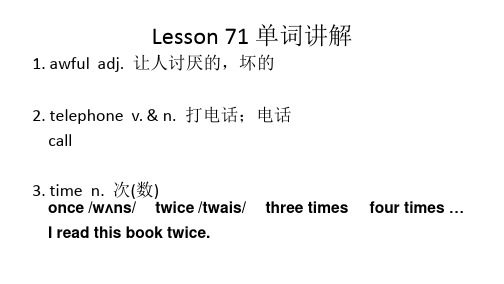
Lesson 71 单词讲解1.awful adj. 让人讨厌的,坏的2.telephone v. & n. 打电话;电话call3.time n. 次(数)once /wʌns/ twice /twais/ three times four times …I read this book twice.4.a nswer v. 接(电话)answer the phonest adj. 最后的,前一次的last night / last week / last month / last year6.phone n. 电话7.again adv. 又一次地Very nice to see you again.8.say (said) v. 说say /sei/ said /sed/ says /sez/say VS speaksay 强调说话的内容She said hello to me.He said sorry to me.My mom always says “Life was like a box of chocolate…”speak 突出说话的方式或动作本身speak loudly speak slowly speak EnglishLesson 71 课文讲解What is the climate like?What is the weather like?He telephoned me again.yesterday evening last nightLesson 71 语法讲解He was in the office.Was he in the office?Yes, he was. No, he wasn’t.He wasn’t in the office.Where was he?Who was in the office?There was a car race in our town in 1998. Was there a car race in our town in 1998? There wasn’t a car race in our town in 1998. What was there in our town in 1998?He went to school yesterday. do did /did/ Did wentDo he go he Do to school yesterday? ? e He like s coffee .He went to school yesterday. do notdid He donotgowent to school yesterday.He didn’t go to school yesterday.He went to school y e s t e r d a y. 他什么时候去上学了?did When do hegowent to school?He went to s c h o o l yesterday. 他昨天去哪了?did goWhere do he went yesterday?He w e n t to school yesterday. 他昨天干什么了?did doWhat do he did yesterday?He went to school yesterday. 昨天谁去上学了?Who went to school y esterday?She lived in New York.Did she live in New York? Yes, she did. No, she didn’t. She didn’t live in New York. Where did she live?Who lived in New York?I bought a book in that bookstore last week. bought /b ɔ : t/ buy 的过去式Did you buy a book in that bookstore last week? Yes, I did. No, I didn’t.I didn’t buy a book in that bookstore last week.When did you buy a book in that bookstore?Where did you buy a book last week?Lesson 72 单词句型讲解Today:this morningthis afternoonthis eveningLesson 72 单词句型讲解t onightLesson 72 单词句型讲解Yesterday:yesterday morningyesterday afternoonyesterday eveningLesson 72 单词句型讲解l ast nightThe day before yesterday:the day before yesterday in the morningthe day before yesterday in the afternoonthe day before yesterday in the evening如遇到视频无法正常播放,课件错误,知识点错t 误h 等e 课n 程问ig 题h ,t 可b 以e 添f 加o 服r 务e Ql Qa 3s 17t 0322794进行解决,学习问题请到知识堂: http:/Tomorrow:tomorrow morningtomorrow afternoontomorrow eveningtomorrow nightThe day after tomorrow:the day after tomorrow in the morningthe day after tomorrow in the afternoonthe day after tomorrow in the eveningthe night after next1.She is going to come now. (when)2.She can come now. (when)3.She wants a new bike. (what)4.There is a book on the table. (what)5.They like black coffee. (what)6.Mary comes from Germany. (where)7.He must go home now. (when)8.She feels ill. (how)9.He has a cold. (what)10.She cleaned her shoes. (when) A 一般疑问句B 特殊疑问句C 否定句1.She is going to come now. (when)Is she going to come now?When is she going to come?She isn’t going to come now.2.She can come now. (when)Can she come now?When can she come?She can’t come now.3.She wants a new bike. (what)Does she want a new bike?What does she want?She doesn’t want a new bike.• 4. There is a book on the table. (what)•Is there a book on the table?•What is there on the table?•There isn’t a book on the table.5.They like black coffee. (what) •Do they like black coffee?•What do they like?•They don’t like black coffee.6.Mary comes from Germany. (where) •Does Mary come from Germany?•Where does Mary come from?•Mary doesn’t come from Germany.7.He must go home now. (when) •Must he go home now?•When must he go home?•He needn’t / mustn’t go home now.8.She feels ill. (how) •Does she feel ill?•How does she feel?•She doesn’t feel ill.9.He has a cold. (what)•Does he have a cold?•What does he have?•What is the matter with him?•He doesn’t have a cold.10.She cleaned her shoes. (when) •Did she clean her shoes?•When did she clean her shoes?•She didn’t clean her shoes.。
新概念英语第一册71课课文
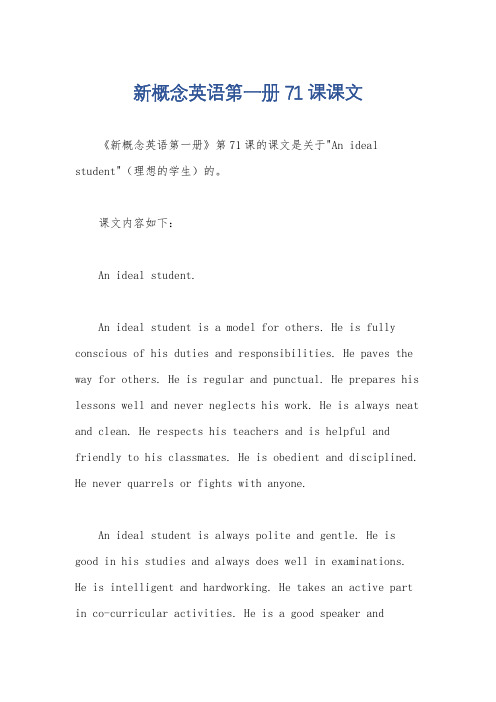
新概念英语第一册71课课文《新概念英语第一册》第71课的课文是关于"An ideal student"(理想的学生)的。
课文内容如下:An ideal student.An ideal student is a model for others. He is fully conscious of his duties and responsibilities. He paves the way for others. He is regular and punctual. He prepares his lessons well and never neglects his work. He is always neat and clean. He respects his teachers and is helpful and friendly to his classmates. He is obedient and disciplined. He never quarrels or fights with anyone.An ideal student is always polite and gentle. He is good in his studies and always does well in examinations. He is intelligent and hardworking. He takes an active part in co-curricular activities. He is a good speaker anddebater. He is also good in sports and games. He is a well-rounded personality.An ideal student is ambitious and has a clear vision of his future. He sets goals for himself and works hard to achieve them. He is focused and determined. He knows the importance of education and strives for excellence in his academic pursuits. He is self-motivated and never gives up easily.An ideal student is not only concerned about his own growth but also about the welfare of others. He is kind and compassionate. He helps those in need and participates in social service activities. He is aware of the issues and challenges faced by society and actively contributes to its betterment.In conclusion, an ideal student is a role model for others. He possesses qualities like discipline, dedication, intelligence, and compassion. He strives for excellence in all aspects of life and works towards personal growth as well as the betterment of society.以上是《新概念英语第一册》第71课的课文内容。
新概念英语第一册Lesson 71-72
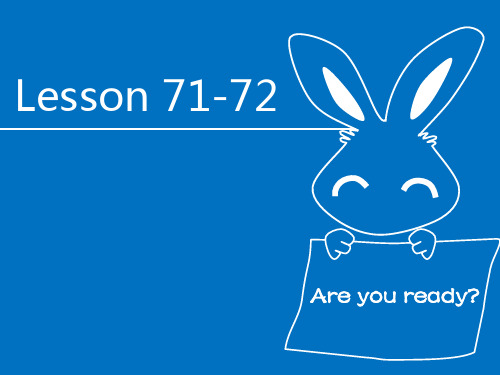
Grammar
一般过去时 要跟表示过去的时间状语连用
今天 today 昨天 yesterday 前天 the day before yesterday
When did you do…?
小试牛刀
What did she/he/they do? they/ clean their shoes/ yesterday he/ open the box/ last night they/ sharpen their pencils/ this evening she/ listen to the radio/ last night they/ play a game/ yesterday afternoon
总结
一般过去式 以实义动词引导的一般过去时 动词的过去式变化规则 表示过去时间的时间状语 句型变化 变否定句 变一般疑问句
See you!
判断下列句子是否正确,正确的写“T”,错误的写“F”, 并改正 01.His mother clean the room every morning. 02.They go to the school on foot every day. 03.He usually reads newspaper after lunch. 04.They don’t doing their homework now. 05.Mr.Black goes to work by a car every day. 06.She and her friend often drinks tea together. 07.I want a envelope,please. 08.I not have any writing papers. 09.What else do you want? 10.The boy playing in the garden.
新概念第一册71课课文
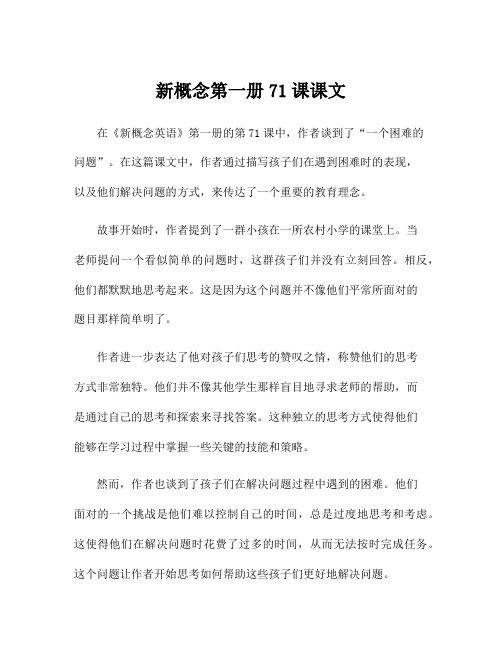
新概念第一册71课课文在《新概念英语》第一册的第71课中,作者谈到了“一个困难的问题”。
在这篇课文中,作者通过描写孩子们在遇到困难时的表现,以及他们解决问题的方式,来传达了一个重要的教育理念。
故事开始时,作者提到了一群小孩在一所农村小学的课堂上。
当老师提问一个看似简单的问题时,这群孩子们并没有立刻回答。
相反,他们都默默地思考起来。
这是因为这个问题并不像他们平常所面对的题目那样简单明了。
作者进一步表达了他对孩子们思考的赞叹之情,称赞他们的思考方式非常独特。
他们并不像其他学生那样盲目地寻求老师的帮助,而是通过自己的思考和探索来寻找答案。
这种独立的思考方式使得他们能够在学习过程中掌握一些关键的技能和策略。
然而,作者也谈到了孩子们在解决问题过程中遇到的困难。
他们面对的一个挑战是他们难以控制自己的时间,总是过度地思考和考虑。
这使得他们在解决问题时花费了过多的时间,从而无法按时完成任务。
这个问题让作者开始思考如何帮助这些孩子们更好地解决问题。
在接下来的一段中,作者提到了一个解决这个问题的方法。
他鼓励孩子们在解决问题时,要学会分析问题的本质,而不是陷入琐碎的细节中。
这样一来,他们可以更快地抓住问题的要点,并能够迅速找到解决问题的方法。
作者还引用了一个心理学家的观点,指出对问题本质的分析和理解是解决问题的关键所在。
最后,作者总结了这个困难问题的教育价值。
他认为,通过遇到困难问题、思考,并试图解决它们,孩子们不仅能够培养独立思考和解决问题的能力,还能够培养他们的兴趣和动力。
这样一来,他们就能更好地应对日后生活中遇到的挑战。
总的来说,第71课的《一个困难的问题》告诉了我们,教育不仅是为了灌输知识,还应该培养学生的思考能力和解决问题的能力。
通过鼓励学生们独立思考、分析问题本质,我们可以帮助他们在面对困难时更加自如地应对,并培养他们未来生活中所需的技能和策略。
这个课文也向我们传达了一个非常重要的教育理念:教育的目的不仅仅是为了教会孩子们掌握知识,还要培养他们的智力、思考能力和解决问题的能力,以应对未来的挑战。
新概念第一册课文翻译及知识点【Lesson67、69、71】

【导语】新概念英语作为⼀套世界闻名的英语教程,以其全新的教学理念,有趣的课⽂内容和全⾯的技能训练,深受⼴⼤英语学习者的欢迎和喜爱。
为了⽅便同学们的学习,⽆忧考为⼤家整理了⾯的新概念第⼀册课⽂翻译及学习笔记,希望为⼤家的新概念英语学习提供帮助!Lesson67 【课⽂】 MRS.JOHNSON: Hello. Were you at the butcher's? MRS.WILLIAMS:Yes. I was. Were you at butcher's, too? MRS.JOHNSON: No, I wasn't. I was at the greengrocer's. How's Jimmy today? MRS.WILLIAMS:He's very well, thank you. MRS.JOHNSON: Was he absent from school last week? MRS.WILLIAMS:Yes, he was. He was absent on Monday, Tuesday, Wednesday and Thursday. How are you all keeping? MRS.JOHNSON: Very well, thank you. We're going to spend three days in the country. We're going to stay at my mother's for the weekend. MRS.WILLIAMS:Friday, Saturday and Sunday in the country! Aren't you lucky! 【课⽂翻译】 约翰逊夫⼈:您好。
刚才您在⾁店⾥吗? 威廉斯夫⼈:是的,我在⾁店⾥。
您也在⾁店⾥吗? 约翰逊夫⼈:不,我不是。
新概念英语第一册Lesson71-76课后答案

新概念英语第一册Lesson71~76课后答案新概念英语第一册Lesson71~72课后答案A1 It is raining now. It rained yesterday.2 It is snowing now. It snowed yesterday.3 He is boiling some eggs. He boiled some yesterday.4 We are enjoying our lunch. We enjoyed it yesterday, too.B1 What did they do yesterday? They cleaned their shoes yesterday.2 What did he do last night? He opened the box last night.3 What did they do this morning? They sharpened their pencils this morning.4 What did she do this evening? She turned on the television this evening.5 What did she do last night? She listened to the radio last night.6 What did she do yesterday morning? She boiled an egg yesterday morning.7 What did they do yesterday afternoon? They playeda game yesterday afternoon.8 What did he do in the morning the day before yesterday? He stayed in bed in the morning the day before yesterday.9 What did she do yesterday evening? She telephoned her husband yesterday evening.10 What did she do the night before last? She called the doctor the night before last.新概念英语第一册Lesson73~74课后答案A1 He read the phrase slowly.2 He worked lazily.3 He cut himself badly.4 He worked carefully.5 The door opened suddenly.B1 He does not know me very well.2 She worked very hard.3 She smiled pleasantly.4 The bus went hurriedly.5 He shaved slowly.6 She drank a glass of water thirstily.7 He greeted me warmly.8 We enjoyed ourselves very much.新概念英语第一册Lesson75~76课后答案A1 She met her friends yesterday.2 They drank some milk yesterday.3 He swam in the river yesterday.4 She took him to school yesterday.5 He cut himself yesterday.B1 When did you walk across the park? I walked across the park last week.2 When did you wash your hands? I washed my handsa minute ago.3 When did you work in an office? I worked in an office the year before last.4 When did you ask a question? I asked a question five minutes ago.5 When did you type those letters? I typed those letters a month ago.6 When did you watch television? I watched television every day this week.7 When did you talk to the shop assistant? I talked to the shop assistant last month.8 When did you thank your father? I thanked myfather an hour ago.9 When did you dust the cupboard? I dusted the cupboard three days ago.10 When did you paint that bookcase? I painted that bookcase the year before last.11 When did you want a car like that one? I wanteda car like that one a year ago.12 When did you greet her? I greeted her a minute ago.。
新概念英语第一册Lesson71 He‘s awful!
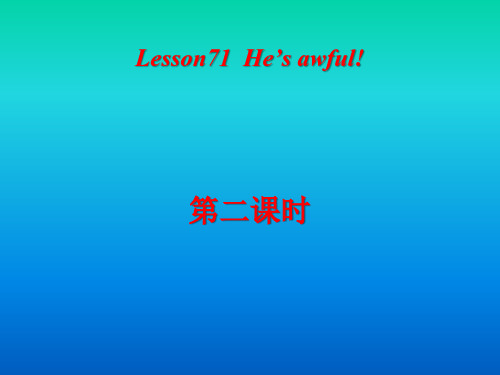
Who is Ron Marston? Ron Marston is a man.
What's Ron Marston like? He's awful!
Why he is awful? He always telephones Pauline.
He said, ‘Pauline is typing letters. She
can’t speak to you now!’
他说:“波琳正在打信。她现在不能跟你讲 话!”
关键句型 6. She can't speak to you now!
她现在不能同你讲话!
speak to sb. 意为“与某人讲话”。 例如打电话时可以说:
a_g_a_i_n_? 4. The phone is ringing. Please a_n_s_w__e_r the phone. 5. I was busy l_a_s_t______ week.
Listen to the tape then answer this question.
How did Pauline answer the telephone at nine o’clock? 波琳在9点接电话时是如何说的?
相关的电话用语如:
This is Mary speaking. 我是玛丽。
This is Mr. Wang calling from Nan yang .
我是王老师,现正在南阳给你打电话。
关键句型
9.询问ቤተ መጻሕፍቲ ባይዱ人过去是否做过某事,并回
答。
问:---Did + sb.+ V原+ 其他? 答:--Yes, sb. did. --No, sb. didn’t. 例如:
新概念英语NCE1_lesson71-72(共13页)课件

• Yes, he did.
• He telephoned (telephone的适当形式) at nine o'clock.
• What did (do的适当形式) you say to him?
您身边的小升初英语专家----鑫鹏学校新概念部
课文再现-英汉互译
• He‘s awful!
• Then I arrived home at six o'clock
• 他讨厌透了!
• What's Ron Marston like, Pauline? • 朗·马斯顿是怎样一个人?
• He telephoned me four times yesterday,
• 前天打了3次。
• He telephoned the office yesterday morning and yesterday afternoon.
• 他昨天上午和下午把电话打到了我的办 公室,
• My boss answered the telephone • 是我的老板接的。
• He said,‘Pauline is typing letters. • 他说:“波琳正在打信,
• What did she do yesterday? • She aired the room yesterday.
• 1 they/ clean their shoes/ yesterday • 2 he/ open the box/ last night • 3 they/ sharpen their pencils/ this morning • 4 she /turn on the television/this evening
新概念英语第一册71课课文
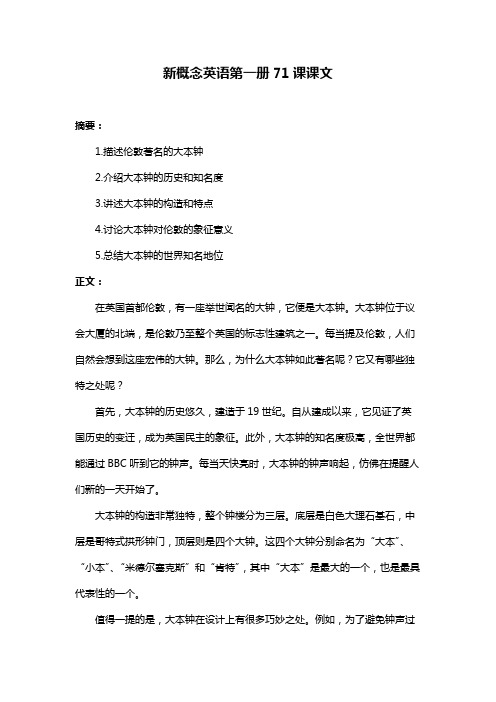
新概念英语第一册71课课文
摘要:
1.描述伦敦著名的大本钟
2.介绍大本钟的历史和知名度
3.讲述大本钟的构造和特点
4.讨论大本钟对伦敦的象征意义
5.总结大本钟的世界知名地位
正文:
在英国首都伦敦,有一座举世闻名的大钟,它便是大本钟。
大本钟位于议会大厦的北端,是伦敦乃至整个英国的标志性建筑之一。
每当提及伦敦,人们自然会想到这座宏伟的大钟。
那么,为什么大本钟如此著名呢?它又有哪些独特之处呢?
首先,大本钟的历史悠久,建造于19世纪。
自从建成以来,它见证了英国历史的变迁,成为英国民主的象征。
此外,大本钟的知名度极高,全世界都能通过BBC听到它的钟声。
每当天快亮时,大本钟的钟声响起,仿佛在提醒人们新的一天开始了。
大本钟的构造非常独特,整个钟楼分为三层。
底层是白色大理石基石,中层是哥特式拱形钟门,顶层则是四个大钟。
这四个大钟分别命名为“大本”、“小本”、“米德尔塞克斯”和“肯特”,其中“大本”是最大的一个,也是最具代表性的一个。
值得一提的是,大本钟在设计上有很多巧妙之处。
例如,为了避免钟声过
于刺耳,钟匠们特意将钟声调成低音。
此外,大本钟的钟摆采用了特殊的材料,以减缓钟摆的摆动速度,使钟声更加悠扬动听。
大本钟对伦敦的意义远不止一座著名的建筑。
它象征着英国人民的团结和坚韧,代表着国家的历史和文化。
在很多重要场合,如新年、国庆日等,大本钟的钟声都会响起,提醒人们庆祝这个特殊的时刻。
总之,大本钟作为伦敦的标志性建筑,在世界范围内享有盛誉。
它的独特之处和历史价值使其成为英国乃至全球的瑰宝。
新概念英语第一册课文及翻译Lesson 71
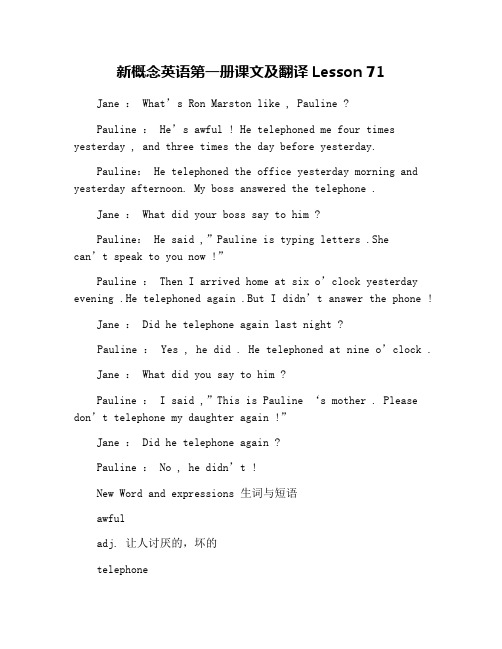
新概念英语第一册课文及翻译Lesson 71 Jane :What’s Ron Marston like , Pauline ?Pauline :He’s awful ! He telephoned me four times yesterday , and three times the day before yesterday.Pauline: He telephoned the office yesterday morning and yesterday afternoon. My boss answered the telephone .Jane : What did your boss say to him ?Pauline:He said ,”Pauline is typing letters .Shecan’t speak to you now !”Pauline : Then I arrive d home at six o’clock yesterday evening .He telephoned again .But I didn’t answer the phone !Jane : Did he telephone again last night ?Pauline :Yes , he did . He telephoned at nine o’clock .Jane : What did you say to him ?Pauline :I said ,”This is Pauline ‘s mother . Please don’t telephone my daughter again !”Jane : Did he telephone again ?Pauline :No , he didn’t !New Word and expressions 生词与短语awfuladj. 让人讨厌的,坏的telephonev. & n. 打电话;电话timen. 次(数)answerv. 接(电话)lastadj. 最后的,前一次的phonen. 电话(=telephone)againadv. 又一次地say (said/sed/)v. 说本文参考译文简:罗恩.马斯顿是怎样一个人?波淋:他讨厌透了!他昨天给我打了4次电话前天打了3次。
新概念一册第71PPT课件

• 4.The girls are playing on the playground.
(就划线部分提问)
• 5.They are cleaning their classroom.
(对划线部分提问)
• 6 Tom does homework every day.
(用now替换画线部分) .
14
• 在电话中回答:This is…. • pretend as 假装
She pretended herself as her mother.
.
12
• 简:波淋,朗.马顿是怎样一个人? • 波淋:他讨厌透了!他昨天给我打了4次电话前天打了3次。 • 波淋:他昨天上午和下午把电话打到了我的办公室,是我的老板
• JANE: Did he telephone again?
• PAULINE: No, he didn't!
.
10
课文讲解
• What's Ron Marston like, Pauline? What is sb. like? 询问某人的外貌或品行。 你爸爸这个人怎么样? What's your father like?
• PAULINE: Yes, he did.
•
He telephoned at nine o'clock.
• JANE: What did you say to him?
• PAULINE: I said, 'This is Pauline's mother.
Please don't telephone my daugmorning and yesterday afternoon. My boss answered the telephone. • JANE: What did your boss say to him? • PAULINE: He said, "Pauline is typing letters. • She can't speak to you now!"
新概念英语第一册71课课文
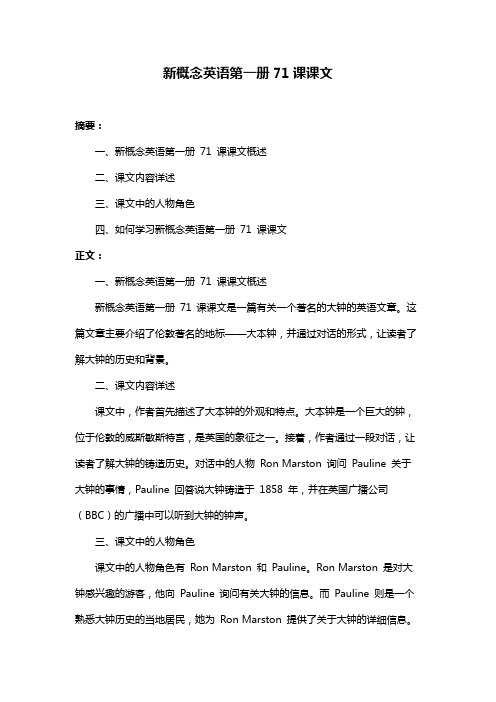
新概念英语第一册71课课文
摘要:
一、新概念英语第一册71 课课文概述
二、课文内容详述
三、课文中的人物角色
四、如何学习新概念英语第一册71 课课文
正文:
一、新概念英语第一册71 课课文概述
新概念英语第一册71 课课文是一篇有关一个著名的大钟的英语文章。
这篇文章主要介绍了伦敦著名的地标——大本钟,并通过对话的形式,让读者了解大钟的历史和背景。
二、课文内容详述
课文中,作者首先描述了大本钟的外观和特点。
大本钟是一个巨大的钟,位于伦敦的威斯敏斯特宫,是英国的象征之一。
接着,作者通过一段对话,让读者了解大钟的铸造历史。
对话中的人物Ron Marston 询问Pauline 关于大钟的事情,Pauline 回答说大钟铸造于1858 年,并在英国广播公司(BBC)的广播中可以听到大钟的钟声。
三、课文中的人物角色
课文中的人物角色有Ron Marston 和Pauline。
Ron Marston 是对大钟感兴趣的游客,他向Pauline 询问有关大钟的信息。
而Pauline 则是一个熟悉大钟历史的当地居民,她为Ron Marston 提供了关于大钟的详细信息。
四、如何学习新概念英语第一册71 课课文
学习新概念英语第一册71 课课文,首先需要熟读课文,理解课文中的故事情节和对话内容。
然后,可以通过背诵课文来提高自己的英语水平。
此外,可以尝试用英语复述课文,以提高自己的英语表达能力。
同时,可以通过学习课文中的生词和短语,丰富自己的词汇量。
新概念英语第一册Lesson71~76自学笔记精讲解析

新概念英语第一册Lesson71~76自学笔记精讲解析新概念英语第一册Lesson71~72自学笔记精讲解析1.What’s Ron Marston like, Pauline? 波琳,朗·马斯顿是怎样一个人?What is sb. like? 这一句式可用来询问某人的外貌或品行。
就本课的具体情况而言,波琳的回答更多地是指马斯顿的品行如何。
2.He telephoned me four times yesterday…他昨天给我打了4次电话……four times, 4次。
time在英语中作不可数名词时表示“时间”;作可数名词时表示“次数”。
请注意英语中次数的表示法:once 1次twice 两次three times 3次3次或3次以上通常都用基数词+ times表示:five times 5次thirty times 30次3.the day before yesterday,前天。
4.answer the telephone,接电话。
口语中也常用 answer the phone。
类似的短语如:answer the door/doorbell应声开门answer a letter回信5.She can’t speak to you now! 她现在不能同你讲话!speak to sb. 意为“与某人说话”。
例如打电话时可以说:May I speak to Pauline, please? 请让波琳接电话好吗?I’ d like to speak to Pauline, please. 我想请波琳听电话。
6.This is Pauline’s mother.我是波琳的母亲。
This is…是英美人打电话时表示“我是……”的句式,而不说I’m…。
相关的电话用语如:This is Mary speaking. 我是玛丽。
This is Edward calling from London. 我是爱德华,现正在伦敦给你打电话。
- 1、下载文档前请自行甄别文档内容的完整性,平台不提供额外的编辑、内容补充、找答案等附加服务。
- 2、"仅部分预览"的文档,不可在线预览部分如存在完整性等问题,可反馈申请退款(可完整预览的文档不适用该条件!)。
- 3、如文档侵犯您的权益,请联系客服反馈,我们会尽快为您处理(人工客服工作时间:9:00-18:30)。
again adv. 再一次,又一次
Try again . Please say it again.
■ again and again 屡次的,再三的 be oneself again (指身体或精神)恢复常态
say (said) v. 说
固定搭配:say to sb. 对某人说
tell sb. about sth. 告诉某人关于某事 例如:Please don’t tell it to your parents. 请不要把这件事告诉给你
On the way home (在回家的路上) ,
my wife said
to me, ‘don’t drive so quickly!’
Key words
awful ['ɔ:ful]
adj.让人讨厌的,坏的
telephone [‘telifəun] v.& n.打电话,电话
time [taim]
你老板和他说了什么? What did your boss say to him?
talk,say,speak,tell 的区别: ★talk 指“谈论”的意思,既可以作名词也可以作动词,作动词时
后面 要接about,with 或to 构成短语来使用。 例如:What are you talking about? 你们正在谈论什么? ★ say 指说的具体内容,后面可接to sb.,指对某人说。 例如:Please say it again. 请把它再说一遍。
time [u]n.时间 [c] n. 次数
1.时间[U]
How time f间[U]
I have no time for novels. 我没有闲暇读小说。
3.次,回[C]
English hurts me a thousand times, but I still regard it as my first love.
我想不起他的电话号码了。 I can’t remember his telephone number.
answer the telephone 听电话
telephone v.打电话
Ron Marston正在给Pauline打电话。 Ron Marston is telephoning Pauline now.
three times four times
once twice
■序数词+time(单数) 第…次 第一次 the first time 第二次 the second time …
answer v. 接(电话)
接电话 answer the telephone 我的老板接的电话 My boss answered the telephone.
[c]n.次(数)
answer ['ɑ:nsə] v.接(电话)
last [lɑ:st]
adj.最后的,前一次的
phone [fəun]
n.电话(=telephone)
again [ə'gein]
adv.又一次地
say [sei]
v.说
Test time
phone awful
time
aga[i'ntelif[ə'ɔu:nf]utle[]əle'gpehino]ne
Warm up
If I were a boy Beyonce If Iwere a boy Even just for a day I' roll out of bed in the morning And throw on what I wanted and go
Review
1.一般过去时中,be动词的形式有:was 和 were ; 单数人称对应的be动词为: was;复数人称对应的be动词为: were 。
“Go out!” she said to me angrily. “滚出去!”她生气地对我 说。
★ speak 指说某种语言,后面可以接to sb.,指和某人说话 例如:I can speak Japanese. 我会说日语。
May I speak to Mr. Black? 我可以和Black 先生说话吗? ★ tell 主要是指告诉,tell sb. sth. = tell sth. to sb. 告诉某人某事
Ron Marston每天早晨给Pauline打电话。 Ron Marston telephones Pauline every morning.
Ron Marston昨晚9点给Pauline打过电话。
Ron Marston telephoned Pauline at nine o’clock yesterday.
last
[sei] [fəun]
[taim] answer
['ɑ:nsə]
[lɑ:st]
say
awful adj.糟糕的; 可怕的; 非常的; 极坏的 awfully adv.非常,极
■awful
他讨厌透了!
He’s awful!
多么糟糕的书写! What awful handwriting!
天气糟糕极了。 The weather is awful.
2.写出下列人称对应的be动词过去式:
you
she
it
we
I
they
he
3.根据69课课文内容填空。
In 1995,there was a very big race.
There were hundreds of (成百上千的) people there.
My wife and I were at the race.
英语伤我千百遍,我待英语如初恋。 他昨天给我打了4次电话,前天打了三次。 He telephoned me four times yesterday, and three times the day before yesterday.
■基数词+times(复数) 几次(两次以上)
三次 四次 … 一次 两次
■awfully =very much 今天天气极热。 It’s awfully hot today. 我非常抱歉。 I’m awfully sorry.
telephone n.电话 ,电话机
我的爸爸昨天买了一个新的电话机。 My father bought a new telephone yesterday.
